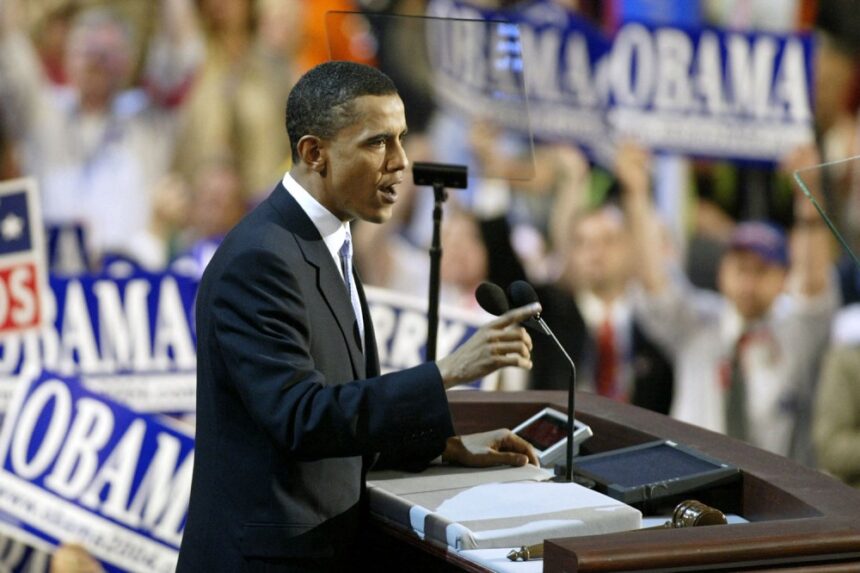Two decades ago, a 42-year-old state senator named Barack Obama gave an inspiring speech at the Democratic National Convention (DNC) in Boston, which energized the party. His ideas laid a robust groundwork for his subsequent triumph as president after four years. As Vice President Kamala Harris and her fellow Democrats make preparations for the Democratic National Convention in Chicago, it is crucial to reflect on the statements made by former President Obama. The keynote talk he delivered in 2024 remains pertinent as it provides a compelling structure to link a progressive agenda rooted in historic Democratic principles to optimistic and future-oriented patriotism.
Obama’s trip to Boston began in early July 2004, when Mary Beth Cahill, Kerry’s campaign manager, asked him to give a speech in a prominent time slot on the second night. In March, the Democratic contender attended a campaign event in Illinois where they had the opportunity to listen to a speech delivered by Obama. The nominee was deeply impressed by Obama’s oratory skills and charisma. Obama sought to succeed retiring Republican Sen. Peter Fitzgerald in Illinois and aimed to highlight the Democrats’ greater inclusivity compared to a Republican Party that was rightly seen as predominantly white, male, rural, and isolated.
Obama diligently began working on the initial version of his speech, which would be very personal and highlight the importance of government assistance in establishing a basis for opportunity. He reached a compromise with Jon Favreau, who was Kerry’s 23-year-old wordsmith at the time. Later, Favreau would go on to become the chief speechwriter for Obama during his presidential campaign in 2008.
Obama’s speech is widely acknowledged for its eloquent and powerful style, but it is also seen as rather idealistic and sentimental in its plea to acknowledge the cohesive aspects of the country.
During his keynote speech, President Obama underscored the relevance of patriotism and the crucial role that the United States’ diversity plays. He stressed the significance of government in guaranteeing equity in the marketplace, as well as the conviction that every American child has a fair chance in life and that the avenues of opportunity are accessible to everyone. Obama promoted a moral capitalism strategy, which prioritized federal actions to guarantee equity and justice in the market.
In his renowned speech, Obama questioned the existence of a dichotomous America divided along political lines, contending that the shared heritage of community in U.S. history held equal significance. He maintained the conviction that our collective bond as a unified populace influenced the nation, enabling us to pursue our personal aspirations while remaining united as a cohesive American community.
Obama conveyed to Democrats and the nation that there exists a unified United States of America, rather than a divided society based on liberal or conservative ideologies. He based his comprehension of Democratic politics on a patriotic perspective, emphasizing that individuals can display their national pride while holding left-leaning political beliefs. As Democrats gear up to commemorate the nomination of the initial female candidate of black and South Asian descent for the presidency, they have demonstrated indications of heeding Obama’s comments and embracing patriotism instead of relinquishing love for their country to the Republicans.
Harris has strategically positioned “freedom” as the central theme of her discourse, thus reclaiming a concept that has traditionally been associated with Republicans. She gets the chance to present a constructive perspective, free from any harsh criticism, on how to enhance the strength of the nation. Voters will cast their ballots in November, but, Democrats have been feeling optimistic sentiments, reinforced by enhanced surveys, and they may be motivated by Obama’s audacity to foresee a more prosperous America.
Read the full article below.
What Harris Can Take From Obama’s Very First Convention Speech
Twenty years ago, a 42-year-old state senator named Barack Obama delivered a stirring address at the Democratic National Convention (DNC) in Boston that galvanized the party. In his speech, which lasted approximately 17 minutes, Obama laid out a bold vision of progressive patriotism. Even though the Democratic nominee that year, Massachusetts Sen. John Kerry, lost to President George W. Bush, Obama’s ideas provided a strong foundation for his own victory as president four years later.
As Vice President Kamala Harris—whom former President Donald Trump, her Republican opponent, is attacking as a “radical”—and fellow Democrats prepare for the DNC in Chicago, they would do well to look back at what Obama had to say. His keynote address remains as relevant in 2024 as it was when he was still a relatively unknown figure on the national stage, because it continues to offer a compelling framework to connect a progressive agenda, steeped in traditional Democratic ideals, to positive, forward-looking patriotism. Rather than a total focus on the existential threat a second Trump term would pose to the country, the Obama speech provides a solid foundation for the politics of joy that Harris and her running mate, Minnesota Gov. Tim Walz, hope can keep their momentum going.
Not every state senator gets a keynote address at the DNC. Kerry’s team, led by Jack Corrigan and Robert Shrum, had considered other high-profile Democrats, including New Mexico Gov. Bill Richardson and Arizona Gov. Janet Napolitano. The parties had traditionally reserved the keynote spot for emerging stars, using the time as a moment to energize the party by showcasing exciting new voices. Although these speeches could often fall flat, there had been several notable historical milestones. In 1976, Texas Rep. Barbara Jordan, the first Black woman to deliver a keynote at either convention, captured the Democratic imagination by speaking about the need to revitalize a sense of community and common purpose after the fractures from Vietnam and Watergate. Eight years later, New York Gov. Mario Cuomo punctured the myth of President Ronald Reagan’s euphoric “Morning in America” message by talking about economic inequality.
Obama’s road to Boston took shape in early July 2004, when Mary Beth Cahill, Kerry’s campaign manager, called to invite him to deliver remarks in prime time on the second night. Cahill finally made the call to Obama after her team had narrowed it down to him and Michigan Gov. Jennifer Granholm, whose “no-nonsense oratory, centrist politics and movie-star good looks have Democrats looking to her as their party’s savior,” as Eleanor Clift noted in Newsweek. Cahill’s was an ask seemingly out of left field; while Obama was surrounded by a talented group of advisors who knew they had someone special on their hands, including David Axelrod and Robert Gibbs, to the rest of the country, he was barely known.
Obama on paper was an awkward choice to tout Kerry because he had come out strongly against the Iraq War, which Kerry as senator had voted to support. But the Democratic nominee had heard Obama speak at a campaign event in Illinois in March and had been impressed by him. His team believed Obama, who was running to replace retiring Republican Sen. Peter Fitzgerald in Illinois, could make a splash. The campaign was also eager to make sure there was high turnout among Black voters who would be critical to defeating Bush, still riding high on his aggressive response to 9/11 and the issue of national security. Obama could showcase how much more representative the Democrats were in contrast to a Republican Party that was justifiably perceived as white, male, rural, and insular. The Democrats also knew that Illinois would be an important open Senate seat.
With his hard work ethic, Obama went to work. He insisted that he wanted to write the first draft on his own, one that would be intensely personal. “I know what I want to do—I want to talk about my story as part of the American story,” Obama told Axelrod. He wanted to stress the “need for government to help provide a foundation of opportunity,” as well as the stories of the people he had met on the campaign trail. The “best of the American spirit,” he recalled in his 2006 memoir, The Audacity of Hope, was “having the audacity to believe despite all the evidence to the contrary that we could retore a sense of community to a nation torn by conflict; the gall to believe that despite personal setbacks, the loss of a job or an illness in the family or a childhood mired in poverty, we had some control—and therefore responsibility—over our own fate. It was that audacity, I thought, that joined us as one people.”
On July 26, Obama flew from Chicago to Boston at 4 a.m. so he could spend the morning appearing on the news shows. He also practiced the speech three times, each session an hour long. Advisors worried that Obama had never spoken from a teleprompter. Initially, his team worried; Obama seemed stiff and choppy. His speech was also far too long.
Throwing him off as the evening approached, Kerry’s 23-year-old speechwriter, Jon Favreau, told Obama that he had to remove a line from the speech that was too close to what the senator was going to say. Obama expressed his frustration at this man who looked barely out of college telling him what to do, but Axelrod pulled Favreau aside and negotiated a compromise. (Favreau would go on to become the top speechwriter for Obama when he ran for the presidency in 2008 and later co-founded the hit political podcast Pod Save America.)
In the end, the speech would inspire and provoke.
Obama’s address has been remembered as a piece of soaring oratory, but it is also now regarded as somewhat naive and nostalgic in its call to recognize the unifying elements of the nation. Still, those memories downplay the real significance of the message Obama offered Democrats.
In his keynote, Obama took on the strain of patriotism that was being promoted by Bush and the Republicans, one that revolved around aggressive militarism and bombastic nationalism.
There were several key components to his argument. The first was the significance of his own background. Obama’s cosmopolitan and international origins reflected the essence of the United States at its best. “I stand here today, grateful for the diversity of my heritage, aware that my parents’ dreams live on in my precious daughters,” he said. “We gather to affirm the greatness of our nation, not because of the height of our skyscrapers or the power of our military or the size of our economy. Our pride is based on a very simple premise, summed up in a declaration made over 200 years ago, ‘We hold these truths to be self-evident, that all men are created equal, that they are endowed by their Creator with certain inalienable Rights, that among these are Life, Liberty, and the pursuit of Happiness.’” In a nation that was made, and perpetually remade, by immigrants, a nation that has grown more diverse, and a nation that is increasingly rooted in global networks, Obama’s story symbolized the strength of American identity.
The second component of his nationalism was the importance of government to ensuring fairness in the marketplace. While acknowledging its limits, Obama insisted that government had an important role to play in ensuring safety and security for all citizens. “Don’t get me wrong. The people I meet in small towns and big cities, in diners and office parks, they don’t expect government to solve all their problems. … But they sense, deep in their bones, that with just a change in priorities, we can make sure that every child in America has a decent shot at life and that the doors of opportunity remain open to all.” Kerry, Obama told the crowd, would offer tax incentives to businesses that created jobs at home and he would make sure Americans could afford decent health insurance. Obama advocated an understanding of government-market relations that fits into a classic Democratic refrain that the historians Michael Kazin and Lizabeth Cohen have termed “moral capitalism.” The idea of moral capitalism was that federal policies were necessary to make certain that the market was fair and just and that all individuals had a chance to become self-sufficient actors.
Finally, there was the most famous part of his keynote, the section where his delivery and words proved to be most powerful, in which Obama challenged the reality of a red and blue America. But he did not simply mean to magically wish away polarization and political differences; he knew these were intensely real. Rather, Obama wanted to argue that the communal tradition in U.S. history was equally powerful.
The country, he said, was shaped by a “belief that we are connected as one people. If there’s a child on the south side of Chicago who can’t read, that matters to me, even if it’s not my child. If there’s a senior citizen somewhere who can’t pay for her prescription and has to choose between medicine and the rent, that makes my life poorer, even if it’s not my grandmother.” According to Obama, the collective was what “allows us to pursue our individual dreams yet still come together as a single American family. ‘E pluribus unum.’ Out of many, one.” This was the rhetorical framework that led Obama to famously note that there were citizens in red states who had gay friends and citizens in blue states who didn’t like “federal agents poking around our libraries.” His message to Democrats, and to the entire nation, was that “there’s not a liberal America and a conservative America—there’s the United States of America.”
Out of those commonalties emerged a driving sense of optimism, rather than the politics of cynicism, anger, and despair. “Do we participate in a politics of cynicism or a politics of hope?” he said. “I’m not talking about blind optimism here. … It’s the hope of slaves sitting around a fire singing freedom songs; the hope of immigrants setting out for distant shores; the hope of a young naval lieutenant bravely patrolling the Mekong Delta; the hope of a millworker’s son who dares to defy the odds; the hope of a skinny kid with a funny name who believes that America has a place for him, too. The audacity of hope!” (This was a phrase he heard from his preacher, Rev. Jeremiah Wright.) In the end, Obama said, “that is God’s greatest gift to us, the bedrock of this nation; the belief in things not seen; the belief that there are better days ahead.”
By the time Obama finished, after having been interrupted 33 times for applause, with delegates shedding tears as they listened, a star was born. “I am proud, as a Black man,” one Illinois delegate said to the press, “to see him give a speech like the one he gave. It was inspirational.” The delegates roared in approval; the pundits agreed that they had just seen the future. They were right.
Rooting his understanding of Democratic politics in a patriotic vision, Obama had reminded Americans that a person could wave the flag proudly while leaning to the left.
As Democrats prepare to celebrate the nomination of the first female Black and South Asian presidential candidate, they have shown signs that they are still listening to what Obama had to say as they move to take ownership of patriotism rather than conceding love of country to the Republicans.
Harris has made this a centerpiece of her message. Toward the end of her address introducing her running mate in Philadelphia, Harris returned to some of the core themes that Obama put on the table 20 years ago. She said the basic question for voters was clear: “What kind of country do we want to live in? … A country of freedom, compassion, and rule of law or a country of chaos, fear, and hate?” She has made “freedom” a framework for her message, reclaiming a term that, as the historian Eric Foner has shown, Republicans have made a centerpiece of their own. While Republicans attempt to demonstrate their patriotism by attacking statements that Walz has made about his 24-year military career, Harris has the opportunity to offer a positive vision, without vitriol, about how to make our nation stronger.
In November, the voters will decide. But at least for now, Democrats have been enjoying some good vibes, supported by some better polls. Perhaps they can finally again feel some of Obama’s audacity to hope for a better America.
By Julian E. Zelizer
Source: Foreign Policy







